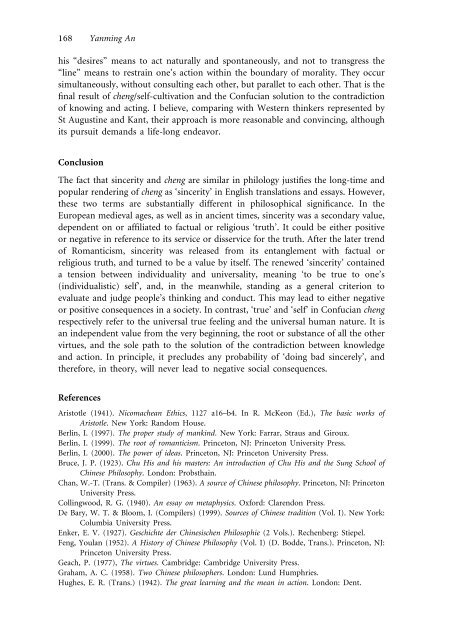Western sincerity and Confucian Cheng
Create successful ePaper yourself
Turn your PDF publications into a flip-book with our unique Google optimized e-Paper software.
168 Yanming An<br />
his “desires” means to act naturally <strong>and</strong> spontaneously, <strong>and</strong> not to transgress the<br />
“line” means to restrain one’s action within the boundary of morality. They occur<br />
simultaneously, without consulting each other, but parallet to each other. That is the<br />
final result of cheng/self-cultivation <strong>and</strong> the <strong>Confucian</strong> solution to the contradiction<br />
of knowing <strong>and</strong> acting. I believe, comparing with <strong>Western</strong> thinkers represented by<br />
St Augustine <strong>and</strong> Kant, their approach is more reasonable <strong>and</strong> convincing, although<br />
its pursuit dem<strong>and</strong>s a life-long endeavor.<br />
Conclusion<br />
The fact that <strong>sincerity</strong> <strong>and</strong> cheng are similar in philology justifies the long-time <strong>and</strong><br />
popular rendering of cheng as ‘<strong>sincerity</strong>’ in English translations <strong>and</strong> essays. However,<br />
these two terms are substantially different in philosophical significance. In the<br />
European medieval ages, as well as in ancient times, <strong>sincerity</strong> was a secondary value,<br />
dependent on or affiliated to factual or religious ‘truth’. It could be either positive<br />
or negative in reference to its service or disservice for the truth. After the later trend<br />
of Romanticism, <strong>sincerity</strong> was released from its entanglement with factual or<br />
religious truth, <strong>and</strong> turned to be a value by itself. The renewed ‘<strong>sincerity</strong>’ contained<br />
a tension between individuality <strong>and</strong> universality, meaning ‘to be true to one’s<br />
(individualistic) self’, <strong>and</strong>, in the meanwhile, st<strong>and</strong>ing as a general criterion to<br />
evaluate <strong>and</strong> judge people’s thinking <strong>and</strong> conduct. This may lead to either negative<br />
or positive consequences in a society. In contrast, ‘true’ <strong>and</strong> ‘self’ in <strong>Confucian</strong> cheng<br />
respectively refer to the universal true feeling <strong>and</strong> the universal human nature. It is<br />
an independent value from the very beginning, the root or substance of all the other<br />
virtues, <strong>and</strong> the sole path to the solution of the contradiction between knowledge<br />
<strong>and</strong> action. In principle, it precludes any probability of ‘doing bad sincerely’, <strong>and</strong><br />
therefore, in theory, will never lead to negative social consequences.<br />
References<br />
Aristotle (1941). Nicomachean Ethics, 1127 a16–b4. In R. McKeon (Ed.), The basic works of<br />
Aristotle. New York: R<strong>and</strong>om House.<br />
Berlin, I. (1997). The proper study of mankind. New York: Farrar, Straus <strong>and</strong> Giroux.<br />
Berlin, I. (1999). The root of romanticism. Princeton, NJ: Princeton University Press.<br />
Berlin, I. (2000). The power of ideas. Princeton, NJ: Princeton University Press.<br />
Bruce, J. P. (1923). Chu His <strong>and</strong> his masters: An introduction of Chu His <strong>and</strong> the Sung School of<br />
Chinese Philosophy. London: Probsthain.<br />
Chan, W.-T. (Trans. & Compiler) (1963). A source of Chinese philosophy. Princeton, NJ: Princeton<br />
University Press.<br />
Collingwood, R. G. (1940). An essay on metaphysics. Oxford: Clarendon Press.<br />
De Bary, W. T. & Bloom, I. (Compilers) (1999). Sources of Chinese tradition (Vol. I). New York:<br />
Columbia University Press.<br />
Enker, E. V. (1927). Geschichte der Chinesischen Philosophie (2 Vols.). Rechenberg: Stiepel.<br />
Feng, Youlan (1952). A History of Chinese Philosophy (Vol. I) (D. Bodde, Trans.). Princeton, NJ:<br />
Princeton University Press.<br />
Geach, P. (1977), The virtues. Cambridge: Cambridge University Press.<br />
Graham, A. C. (1958). Two Chinese philosophers. London: Lund Humphries.<br />
Hughes, E. R. (Trans.) (1942). The great learning <strong>and</strong> the mean in action. London: Dent.


